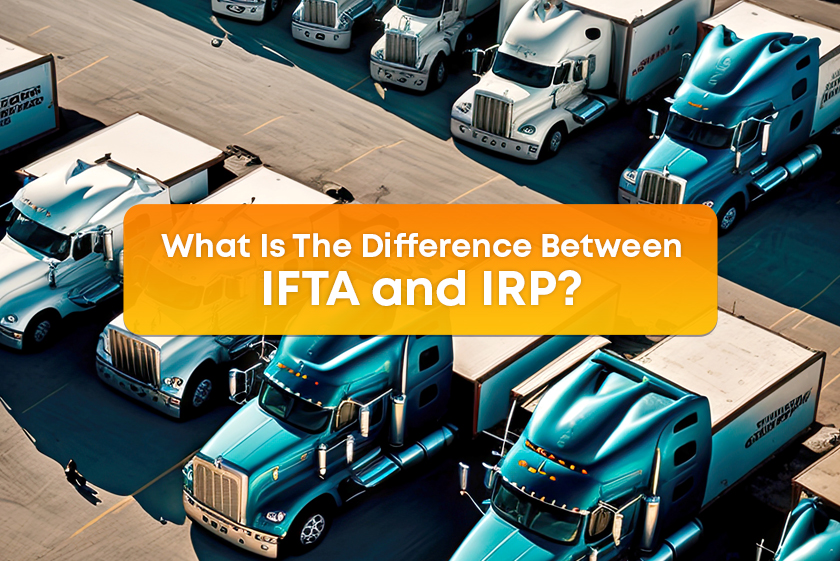
What Is The Difference Between IFTA and IRP?
In the world of trucking compliance, navigating the alphabet soup of regulations and acronyms can be daunting. Two key components of interstate trucking operations that often cause confusion are the International Fuel Tax Agreement (IFTA) and the International Registration Plan (IRP).
While both are integral to maintaining compliance for commercial vehicles, they serve distinct purposes and have unique requirements. Let's delve into the details to understand the difference between IFTA and IRP.
What is IFTA?
The International Fuel Tax Agreement (IFTA) is a cooperative agreement among the lower 48 U.S. states and 10 Canadian provinces that facilitates the reporting and payment of fuel taxes by interstate motor carriers. The primary goal of IFTA is to simplify the administration of fuel taxes for vehicles that operate across various jurisdictions.
Under IFTA, the qualified motor carriers are required to obtain an IFTA license and maintain detailed records of fuel purchases and usage for each jurisdiction travelled. These records are used to calculate and report quarterly fuel tax obligations to the appropriate jurisdictions.
The taxes collected through IFTA are then distributed among the jurisdictions based on the mileage travelled in each state or province.
What Is IRP?
On the other hand, the International Registration Plan (IRP) is a registration reciprocity agreement that allows commercial vehicles to travel across participating jurisdictions with a single registration.
The IRP simplifies the registration process for interstate motor carriers by eliminating the need to obtain separate registrations for each state or province in which they operate.
Under the IRP, motor carriers must register their vehicles with their base jurisdiction, which is typically the jurisdiction where they have established a significant operational presence.
The registration fees paid by motor carriers are then split among the jurisdictions based on the percentage of miles travelled in each jurisdiction.
Difference Between IFTA and IRP
Purpose:
- IFTA: Primarily focuses on reporting and paying fuel taxes for interstate motor carriers.
- IRP: Facilitates the registration of commercial vehicles for interstate travel, allowing them to operate across multiple jurisdictions with a single registration.
Requirements:
- IFTA: Requires motor carriers to maintain detailed fuel records and report quarterly fuel tax obligations.
- IRP: Requires motor carriers to register their vehicles with their base jurisdiction and pay registration fees based on the mileage travelled in each jurisdiction.
Coverage:
- IFTA: Covers the reporting and payment of fuel taxes for qualified motor carriers operating in participating U.S. states and Canadian provinces.
- IRP: Allows commercial vehicles to travel across participating U.S. states and Canadian provinces with a single registration.
Which is Right for Your Trucking Business?
When it comes to deciding between IFTA and IRP for your trucking business, several factors come into play. Both agreements offer distinct benefits and serve different purposes, so it's essential to evaluate your specific operational needs and compliance obligations before making a decision.
Here are some considerations to help you determine which option is right for you:
Operational Scope:
- If your trucking operations primarily involve transporting goods across multiple jurisdictions and you're concerned about fuel tax reporting, IFTA may be the better choice. It streamlines the process of reporting and paying fuel taxes for interstate travel, saving you time and administrative hassle.
- On the other hand, if your focus is on vehicle registration and ensuring compliance with registration requirements across multiple states or provinces, IRP is the way to go. It allows you to register your commercial vehicles with your base jurisdiction and obtain a single registration for interstate travel, simplifying the registration process.
Geographic Coverage:
- Consider the jurisdictions in which you operate or plan to operate your commercial vehicles. IFTA covers fuel tax reporting for qualified motor carriers operating in most U.S. states and Canadian provinces, while IRP facilitates vehicle registration for interstate travel across participating jurisdictions.
- Evaluate your routes and determine which agreement provides the broader coverage you need.
Administrative Burden:
- Assess the administrative burden associated with compliance under each agreement. While both IFTA and IRP require some level of record-keeping and reporting, consider which agreement aligns better with your existing administrative processes and resources.
- Choose the option that will minimize the paperwork and simplifies the compliance tasks for your business.
Cost Considerations:
- Evaluate the costs associated with compliance under each agreement. IFTA requires motor carriers to pay quarterly fuel taxes based on mileage travelled in each jurisdiction, while IRP involves registration fees based on the percentage of miles travelled in participating jurisdictions.
- Compare the potential costs under each agreement and choose the option that offers the most cost-effective solution for your business.
Consultation with Experts:
- If you're unsure about which option is best suited to your trucking business, consider seeking advice from trucking compliance experts or industry professionals such as Trux Solutions. We can provide valuable guidance based on your situation and help you make an informed decision that will align with your business goals and compliance needs.
In summary, while both IFTA and IRP are important components of interstate trucking compliance, they serve distinct purposes and have different requirements. Understanding the differences between IFTA and IRP is highly important for motor carriers to make sure they remain compliant with the fuel tax reporting and vehicle registration obligations.
By adhering to the requirements of both agreements, motor carriers can go through the process of interstate travel seamlessly while fulfilling their compliance obligations.
Feel free to learn more about how you can become compliant with IFTA or with IRP by contacting us at Trux Solutions, we will help your business become compliant with strict trucking regulations and help your trucking business become more profitable.

